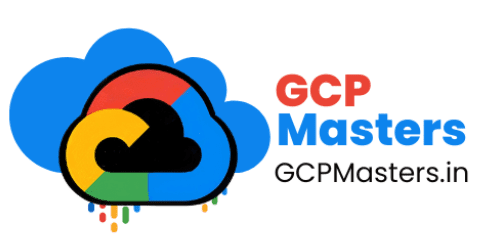Google Cloud Platform Servers
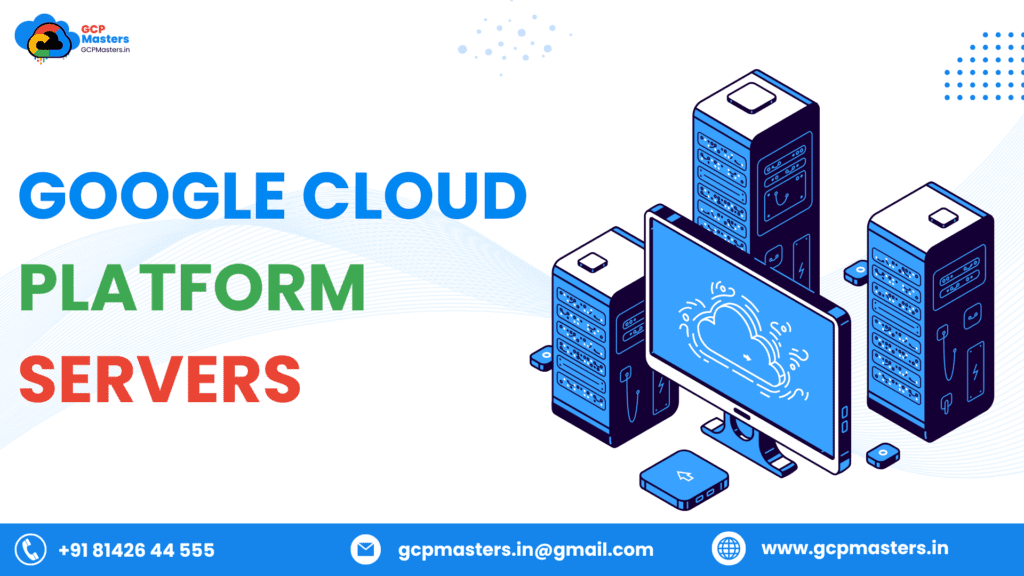
Introduction to Google Cloud Platform Servers
In today’s digital era, businesses and developers rely heavily on cloud computing to build, deploy, and scale applications efficiently. Google Cloud Platform (GCP) is one of the leading cloud service providers, offering a wide range of solutions to host and manage servers with high performance, security, and reliability.
Why Google Cloud Platform Servers Matter in Modern IT Infrastructure
Traditional on-premises servers require significant investment in hardware, maintenance, and security. In contrast, cloud servers provide on-demand computing resources, allowing organizations to scale effortlessly based on demand. Cloud servers are essential in modern IT infrastructure because they offer:
- Scalability: Easily scale up or down based on business needs.
- Cost Efficiency: Pay only for what you use, reducing operational expenses.
- Global Reach: Deploy applications closer to users with a global network.
- Security & Compliance: Built-in security features and compliance certifications ensure data protection.
- High Availability: Redundant infrastructure ensures minimal downtime and maximum uptime.
Benefits of Using Google Cloud Platform for Server Hosting
Google Cloud Platform provides a robust environment for hosting servers, offering several advantages over traditional and other cloud solutions
1. Flexible Compute Options
GCP offers various server hosting options, including
- Compute Engine (VMs): Customizable virtual machines with different CPU, memory, and GPU configurations.
- App Engine: A fully managed platform for serverless application hosting.
- Kubernetes Engine (GKE): Managed Kubernetes clusters for containerized applications.
2. Cost-Effective Pricing
GCP provides sustained use discounts, preemptible VMs, and committed use contracts, making it a cost-effective solution compared to other cloud providers.
3. Strong Security and Compliance
With built-in encryption, identity and access management (IAM), and DDoS protection, GCP ensures secure server hosting. It also complies with industry standards such as ISO 27001, HIPAA, and SOC 2.
4. High Performance and Reliability
GCP’s global network of data centers and advanced networking infrastructure ensure low-latency performance and 99.99% uptime for mission-critical applications.
5. Seamless Integration with AI & Big Data
GCP offers native integrations with AI/ML and Big Data tools like BigQuery, Vertex AI, and Cloud Dataflow, enabling businesses to leverage advanced analytics and AI-driven insights.
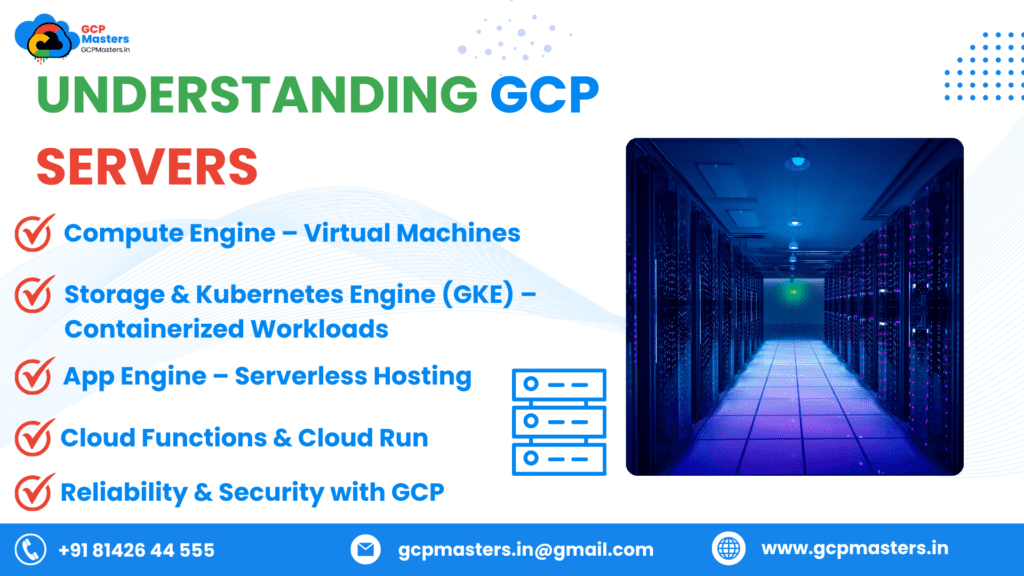
Understanding Google Cloud Platform Servers
As businesses embrace digital transformation, cloud servers have become a crucial part of modern IT infrastructure. Google Cloud Platform (GCP) offers powerful and scalable server solutions that cater to a wide range of workloads. In this article, we’ll explore cloud servers, how they differ from traditional on-premises servers, and why GCP is an excellent choice for scalable and reliable cloud computing.
What is a Google Cloud Platform Servers ?
A cloud server is a virtualized computing resource hosted on a cloud provider’s infrastructure. Unlike traditional physical servers, cloud servers run on shared or dedicated cloud environments and provide on-demand access to computing power, storage, and networking.
Key Features of Cloud Servers
✔ On-Demand Scalability – Resources can be adjusted based on workload.
✔ Remote Access – Accessible from anywhere with an internet connection.
✔ Cost Efficiency – Pay for only what you use with flexible pricing models.
✔ High Availability – Redundant systems ensure minimal downtime.

Traditional On-Premises Servers vs. Cloud Servers
| Feature | Traditional On-Premises Servers | Cloud Servers (GCP) |
| Infrastructure | Physical hardware maintained in data centers. | Virtualized infrastructure managed by the cloud provider. |
| Scalability | Requires manual hardware upgrades. | Instantly scalable with auto-scaling capabilities. |
| Cost | High upfront capital investment in hardware. | Pay-as-you-go pricing, reducing operational costs. |
| Maintenance | IT teams must handle maintenance, security, and updates. | Fully managed by GCP with automatic updates. |
| Availability | Risk of hardware failure and downtime. | Redundant cloud infrastructure ensures high availability. |
How GCP Provides Scalable and Reliable Server Solutions
Google Cloud Platform (GCP) stands out in the cloud computing landscape by offering highly scalable and reliable server solutions. Whether you’re a startup, an enterprise, or a developer, GCP provides flexible and cost-effective cloud server options.
1. Compute Engine – Virtual Machines (VMs)
GCP’s Compute Engine allows users to create and manage virtual machines with customizable configurations, making it ideal for running applications, databases, and high-performance computing workloads.
✔ Choose from predefined or custom machine types.
✔ Support for GPUs and TPUs for AI/ML workloads.
✔ Auto-scaling to handle fluctuating workloads.
2. Kubernetes Engine (GKE) – Containerized Workloads
For businesses running containerized applications, GCP’s Kubernetes Engine (GKE) provides a managed Kubernetes service that automates deployment, scaling, and management of container workloads.
✔ Fully managed Kubernetes clusters.
✔ Automatic scaling and load balancing.
✔ Seamless integration with CI/CD pipelines.
3. App Engine – Serverless Hosting
For developers who want to focus on writing code without managing infrastructure, App Engine is a serverless platform that automatically scales based on demand.
✔ Fully managed environment for applications.
✔ Supports multiple programming languages (Python, Java, Node.js, etc.).
✔ Auto-scaling ensures cost-efficient resource utilization.
4. Cloud Functions & Cloud Run – Event-Driven & Containerized Serverless Computing
- Cloud Functions enables event-driven serverless computing for microservices and real-time processing.
- Cloud Run allows running containers in a fully managed, scalable environment.
5. Reliability & Security with GCP
GCP ensures 99.99% uptime SLA, global infrastructure, and advanced security features, including:
✔ Identity & Access Management (IAM) – Role-based access control.
✔ DDoS Protection – Built-in security against cyber threats.
✔ Data Encryption – End-to-end encryption for data in transit and at rest.

Types of Servers in Google Cloud Platform
Google Cloud Platform (GCP) offers a variety of server solutions to meet different computing needs. Whether you need full control over virtual machines, a serverless environment for your applications, or a containerized solution, GCP provides the flexibility to choose the right server type for your workload. In this article, we’ll explore the different types of servers in GCP and their use cases.
1. Compute Engine – Virtual Machines (VMs) for Customizable Workloads
Compute Engine provides Infrastructure-as-a-Service (IaaS) by allowing users to create and manage Virtual Machines (VMs) with customizable configurations. It is ideal for those who need complete control over their server environments, similar to traditional on-premises servers.
Key Features:
✔ Fully customizable VM instances with different CPU, memory, and GPU options.
✔ Choice of operating systems (Linux, Windows, custom images).
✔ Auto-scaling and load balancing for high availability.
✔ Integration with Persistent Disks, Cloud Storage, and VPC networking.
Best Use Cases:
✅ Hosting websites, databases, and enterprise applications.
✅ Running high-performance computing (HPC) workloads.
✅ AI/ML model training with GPU and TPU support.
2. App Engine – Fully Managed Serverless Application Hosting
App Engine is a Platform-as-a-Service (PaaS) that allows developers to build, deploy, and scale applications without managing the underlying infrastructure. It provides a fully managed environment with automatic scaling, monitoring, and security.
Key Features:
✔ Supports multiple programming languages (Python, Java, Node.js, Go, etc.).
✔ Serverless, so you don’t need to manage infrastructure.
✔ Automatic scaling based on traffic load.
✔ Integrated logging and monitoring with Cloud Logging and Cloud Monitoring.
Best Use Cases:
✅ Hosting web applications and APIs.
✅ Mobile app backends and microservices.
✅ Scalable applications with unpredictable traffic patterns.
3. Kubernetes Engine (GKE) – Managed Kubernetes for Containerized Applications
Kubernetes Engine (GKE) is a managed container orchestration service that automates the deployment, scaling, and management of containerized applications. It is built on Kubernetes, the open-source container management system.
Key Features:
✔ Fully managed Kubernetes clusters with automated upgrades.
✔ Auto-scaling for efficient resource utilization.
✔ Integrated networking, security, and monitoring.
✔ Support for hybrid and multi-cloud deployments.
Best Use Cases:
✅ Deploying and managing containerized applications at scale.
✅ Running microservices-based architectures.
✅ Multi-cloud and hybrid cloud strategies.
4. Cloud Functions – Event-Driven Serverless Computing
Cloud Functions is a Function-as-a-Service (FaaS) offering that allows developers to run small, event-driven functions in a serverless environment. It automatically scales and executes code in response to triggers, such as HTTP requests, database changes, or cloud storage events.
Key Features:
✔ No need to manage servers or infrastructure.
✔ Supports multiple triggers, including Pub/Sub messages, HTTP requests, and Cloud Storage events.
✔ Pay-per-execution pricing model.
✔ Secure and scalable by design.
Best Use Cases:
✅ Processing real-time events (e.g., image processing, data transformation).
✅ Chatbots, notifications, and automated workflows.
✅ Backend logic for mobile and web applications.
5. Cloud Run – Serverless Container Execution
Cloud Run is a fully managed serverless container platform that allows you to deploy and run containerized applications without managing servers. Unlike Kubernetes Engine, Cloud Run is designed for serverless workloads and automatically scales to zero when not in use.
Key Features:
✔ Fully managed or self-managed (Cloud Run on GKE).
✔ Runs any containerized application in a serverless environment.
✔ Supports multiple programming languages and frameworks.
✔ Auto-scaling from zero to thousands of instances.
Best Use Cases:
✅ Running APIs and web services in a serverless environment.
✅ Deploying microservices in a cost-efficient way.
✅ Hosting containerized applications without managing infrastructure.
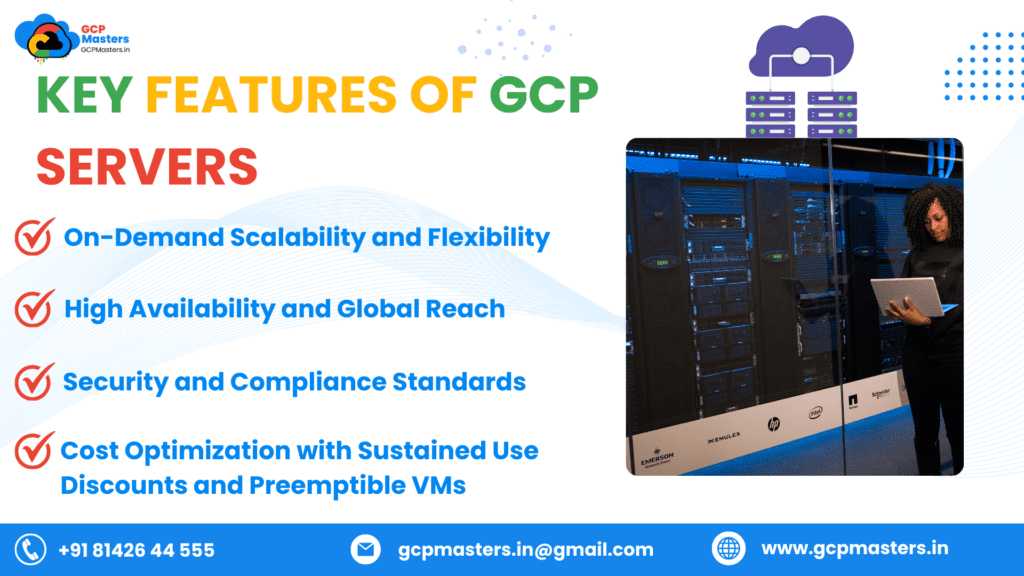
Key Features of Google Cloud Platform Servers
Google Cloud Platform (GCP) provides a powerful and flexible cloud infrastructure for businesses, developers, and enterprises. GCP servers are designed to deliver high performance, reliability, security, and cost-effectiveness. Whether you’re running a small application or managing enterprise-scale workloads, GCP offers the right tools and features to optimize your cloud experience. In this blog, we’ll explore the key features of GCP servers and how they can benefit your business.
On-Demand Scalability and Flexibility
One of the biggest advantages of cloud computing is the ability to scale resources on demand. GCP servers allow you to increase or decrease computing power based on your workload needs, ensuring optimal performance without over-provisioning resources.
How GCP Delivers Scalability:
✔ Auto-scaling: Automatically adjusts resources based on traffic or workload demands.
✔ Custom Machine Types: Create VMs with custom CPU, memory, and storage configurations.
✔ Serverless Options: Services like Cloud Run and App Engine scale automatically without manual intervention.
Use Cases:
✅ E-commerce websites handling seasonal traffic spikes.
✅ AI/ML workloads that require high computing power on demand.
✅ Media streaming services that need to scale globally.
High Availability and Global Reach
Google’s cloud infrastructure is built for high availability and low-latency global access. With data centers in multiple regions, GCP ensures applications remain accessible and resilient, even in the face of failures or increased traffic.
How GCP Ensures High Availability:
✔ Multi-region and multi-zone deployments for redundancy and failover protection.
✔ Load balancing to distribute traffic across multiple servers.
✔ Uptime SLA of 99.99% for mission-critical workloads.
Global Network Reach:
✔ Deploy applications closer to users with Google’s global network.
✔ Cloud CDN for delivering content with low latency and high performance.
✔ Peering and interconnect options to connect on-premises networks to GCP.
Use Cases:
✅ Enterprises running business-critical applications.
✅ Global SaaS platforms requiring low-latency user experiences.
✅ Disaster recovery solutions that need multi-region failover.
Security and Compliance Standards
Security is a top priority in cloud computing, and GCP provides industry-leading security measures to protect your data, applications, and infrastructure. Google’s security-first approach includes encryption, identity management, and compliance certifications to ensure robust protection.
GCP Security Features:
✔ Identity & Access Management (IAM): Control user permissions and roles securely.
✔ Built-in DDoS Protection: Defends against cyber threats and network attacks.
✔ Shielded VMs: Protects virtual machines from rootkits and unauthorized changes.
✔ Encryption: Data is encrypted in transit and at rest.
Compliance & Certifications:
✔ GDPR, HIPAA, SOC 2, ISO 27001, and more.
✔ Regular security audits and threat detection.
✔ Confidential Computing for enhanced data privacy.
Use Cases:
✅ Healthcare organizations handling sensitive patient data.
✅ Financial institutions ensuring compliance with regulatory standards.
✅ Enterprises needing advanced data protection against cyber threats.
Cost Optimization with Sustained Use Discounts and Preemptible VMs
One of the standout features of GCP is its cost-efficient pricing model, designed to provide maximum performance at minimal cost. Unlike traditional fixed pricing models, GCP offers flexible pricing options that allow businesses to optimize cloud spending.
How GCP Helps Reduce Costs:
✔ Sustained Use Discounts: Automatically applied when VMs run for a long duration, reducing costs without upfront commitments.
✔ Preemptible VMs: Short-lived, low-cost VMs ideal for batch processing and non-critical workloads (up to 80% cheaper than regular VMs).
✔ Committed Use Contracts: Get deep discounts for long-term commitments (1 to 3 years).
✔ Per-Second Billing: Pay only for the exact computing time you use.
Use Cases:
✅ AI/ML training and batch processing using Preemptible VMs.
✅ Long-running applications benefiting from Sustained Use Discounts.
✅ Enterprises saving costs on predictable workloads with Committed Use Contracts.
Setting Up a Google Cloud Platform Server with Compute Engine
Google Cloud Platform (GCP) provides a robust and scalable infrastructure for hosting applications, databases, and workloads. Compute Engine, GCP’s Virtual Machine (VM) service, allows users to create and manage cloud-based servers tailored to their needs.
In this guide, we’ll walk you through the step-by-step process of setting up a GCP server using Compute Engine.
Creating a Virtual Machine (VM) Instance
A Virtual Machine (VM) instance is the core of any cloud server. Follow these steps to create your first VM in Compute Engine:
1️⃣ Go to the Google Cloud Console and navigate to Compute Engine → VM Instances.
2️⃣ Click on “Create Instance” to start the setup.
3️⃣ Provide a name for your VM instance and select a region and zone based on your preferred geographical location.
4️⃣ Choose the machine configuration, including CPU, memory, and disk size.
🔹 Tip: Choosing a region closer to your users ensures low latency and better performance.
Selecting the Right Machine Type
GCP offers different machine families to optimize performance for different workloads. Selecting the right machine type ensures cost-efficiency and optimal performance.
| Machine Family | Best For | Example Types |
| E2 Series | Cost-effective, general-purpose workloads | E2-standard-2, E2-Highmem-4 |
| N1/N2 Series | Balanced performance and flexibility | N1-standard-4, N2-high CPU-8 |
| C2 Series | Compute-intensive tasks like gaming, AI/ML | C2-standard-16, C2-high CPU-30 |
| M Series | Memory-intensive applications | M2-ultra mem-416 |
🔹 Tip: For cost-saving, choose E2 instances for general workloads, and for performance-demanding applications, go with C2 or N2 series.
Configuring OS, Disk Storage, and Networking
Once you’ve selected the machine type, it’s time to configure the operating system (OS), storage, and networking settings.
Choosing an Operating System
GCP supports multiple OS choices, including:
✔ Linux (Ubuntu, Debian, CentOS, Red Hat, SUSE)
✔ Windows Server (2016, 2019, 2022)
💡 Tip: If you’re running open-source applications, go for Linux VMs to save licensing costs.
Configuring Disk Storage
GCP offers different storage types for your VM:
✔ Standard Persistent Disk (Cost-effective, best for general workloads).
✔ Balanced Persistent Disk (Faster performance at a lower cost).
✔ SSD Persistent Disk (High-speed storage for databases and applications).
💡 Tip: Use SSD disks for databases and Standard disks for normal workloads.
Setting Up Networking
By default, Compute Engine assigns a public IP address to your VM. You can:
✔ Assign a static IP for consistent external access.
✔ Configure VPC networking for internal communication between multiple VMs.
Managing Firewall Rules and IAM Permissions
Configuring Firewall Rules
Firewalls in GCP control incoming and outgoing network traffic. By default, all incoming traffic is blocked unless explicitly allowed.
✔ To allow SSH, RDP, or HTTP/S traffic, enable the corresponding firewall rules:
🔹 Allow HTTP/HTTPS: Required for web servers.
🔹 Allow SSH (port 22): Needed for remote access.
🔹 Allow RDP (port 3389): For Windows remote desktop connections.
Setting IAM Permissions
To manage security and access control, IAM roles are assigned to users. Common roles include:
✔ Compute Admin: Full control over VM instances.
✔ Compute Viewer: Read-only access to VM instances.
✔ Owner/Editor: Manage all GCP resources, including Compute Engine.
💡 Tip: Use least privilege access to ensure security—only grant necessary permissions.

Server Management Best Practices in Google Cloud Platform
Managing servers efficiently in the cloud is crucial for maintaining performance, security, and cost-effectiveness. Google Cloud Platform (GCP) provides powerful tools and features to help businesses optimize their Compute Engine instances. In this blog, we’ll explore the best practices for server management in GCP, covering performance tuning, security enhancements, automation, and monitoring.
Optimizing Performance and Cost-Efficiency
One of the biggest challenges in cloud computing is balancing performance with cost. GCP offers several ways to optimize server performance while keeping expenses under control.
Best Practices for Performance Optimization
✔ Choose the Right Machine Type: Select the appropriate CPU, memory, and disk type based on your workload (e.g., N2 for general workloads, C2 for compute-intensive tasks).
✔ Use Auto-Scaling: Enable Managed Instance Groups (MIGs) to automatically adjust resources based on traffic.
✔ Optimize Disk Performance: Use SSD Persistent Disks for IOPS-intensive applications like databases.
✔ Leverage Load Balancing: Distribute traffic efficiently with Cloud Load Balancing to prevent server overload.
Best Practices for Cost Optimization
✔ Use Preemptible VMs: Save up to 80% by running non-critical workloads on Preemptible VMs.
✔ Enable Sustained Use Discounts: Compute Engine offers automatic discounts for long-running instances.
✔ Use Committed Use Contracts: Get deep discounts by committing to 1- or 3-year VM usage.
✔ Turn Off Unused Resources: Schedule idle VMs to shut down automatically using Cloud Scheduler.
Implementing Security Best Practices
Security is a top priority in cloud environments. GCP provides several security features to protect your servers from cyber threats, unauthorized access, and data breaches.
Key Security Best Practices
🔹 Use Virtual Private Cloud (VPC) for Network Security
✔ Isolate workloads using VPC networks and subnetworks.
✔ Implement Private Google Access to keep internal traffic within Google’s network.
✔ Use VPC Service Controls to prevent data exfiltration.
🔹 Manage Access with IAM (Identity and Access Management)
✔ Follow the principle of least privilege (PoLP)—grant only necessary permissions.
✔ Assign roles instead of individual permissions to users.
✔ Use IAM Conditions to restrict access based on time, location, or IP address.
🔹 Enable Shielded VMs for Advanced Protection
✔ Protect against rootkits and boot-level attacks with Shielded VMs.
✔ Enable Secure Boot to ensure that only trusted OS images load.
✔ Use integrity monitoring to detect unexpected changes to your VM.
🔹 Implement Firewalls and Security Rules
✔ Allow only necessary inbound and outbound traffic using Firewall Rules.
✔ Restrict SSH/RDP access to specific IP addresses.
✔ Use Cloud Armor to protect against DDoS attacks.
Automating Deployments Using Terraform and Deployment Manager
Manually managing infrastructure can lead to errors and inefficiencies. Infrastructure as Code (IaC) helps automate deployments, making server management faster and more reliable.
Best Tools for Automation in GCP
🔹 Terraform (Recommended for Multi-Cloud Environments)
✔ Define infrastructure as code using HCL (HashiCorp Configuration Language).
✔ Automate VM creation, network configuration, and security settings.
✔ Easily version control infrastructure changes with Git.
🔹 Google Cloud Deployment Manager (Native GCP Solution)
✔ Automate deployments using YAML or Jinja2 templates.
✔ Manage resources like VMs, networks, and IAM policies declaratively.
✔ Works seamlessly with GCP services.
Why Automate Deployments?
✔ Consistency: Ensure identical infrastructure across multiple environments.
✔ Efficiency: Reduce manual setup time for servers.
✔ Scalability: Quickly deploy multiple instances for production workloads.
Monitoring and Logging with Cloud Monitoring and Cloud Logging
Proactive monitoring and logging are essential to detect performance issues, security threats, and operational inefficiencies. GCP offers Cloud Monitoring and Cloud Logging to help track server health and logs in real-time.
Setting Up Cloud Monitoring
✔ Enable Cloud Monitoring to track CPU, memory, and disk usage.
✔ Create custom dashboards to visualize performance metrics.
✔ Set up alerts and notifications for high CPU usage, low disk space, or instance failures.
Setting Up Cloud Logging
✔ Capture system logs, application logs, and security logs automatically.
✔ Use Log-based Alerts to get notified of suspicious activities.
✔ Store logs in Cloud Storage or export them to BigQuery for analysis.
Integrating Third-Party Tools
✔ Use Prometheus & Grafana for advanced monitoring dashboards.
✔ Integrate Splunk, Datadog, or Elastic Stack for log analysis.
✔ Enable Cloud Security Command Center (SCC) to detect security threats.
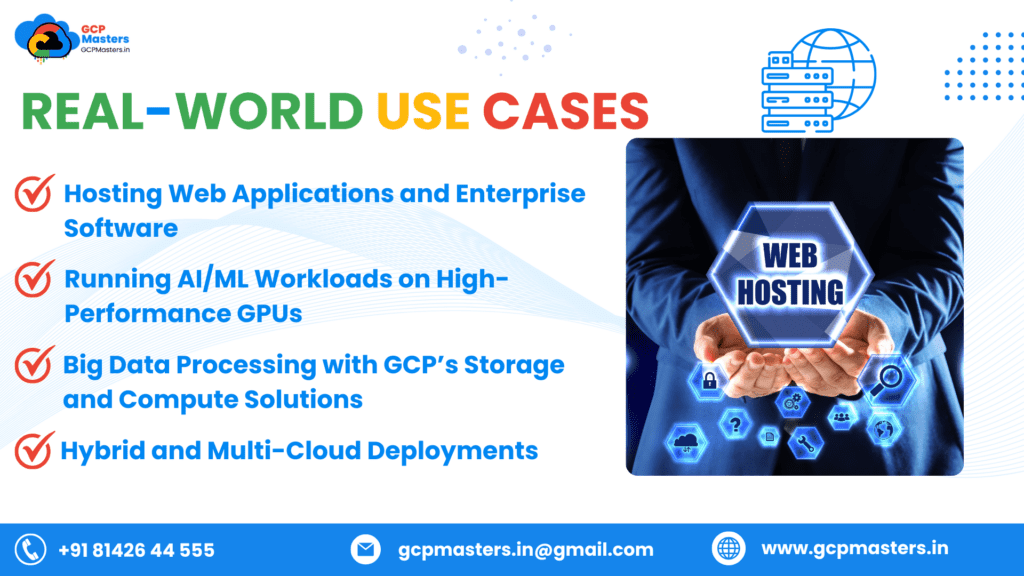
Real-World Use Cases of Google Cloud Platform Servers
Google Cloud Platform (GCP) offers a powerful and flexible infrastructure for businesses across various industries. Whether you’re hosting a web application, running machine learning models, processing big data, or managing hybrid cloud deployments, GCP provides the scalability, security, and performance needed to handle complex workloads efficiently.
In this blog, we will explore some of the most common real-world use cases of GCP servers and how businesses leverage them to drive innovation and efficiency.
Hosting Web Applications and Enterprise Software
Businesses need reliable, high-performance infrastructure to host websites, applications, and enterprise software. GCP provides multiple solutions for seamless application deployment and management.
Add Your Heading Text Here
✔ Compute Engine: Deploy and manage web applications on Virtual Machines (VMs) with full customization.
✔ App Engine: Use a fully managed, serverless platform to run web applications without worrying about infrastructure.
✔ Cloud Run: Deploy containerized applications with automatic scaling and load balancing.
✔ Cloud SQL & Firestore: Store and manage structured and unstructured data securely.
Add Your Heading Text Here
- E-commerce platforms (e.g., Shopify, Flipkart) use GCP to handle millions of transactions.
- SaaS applications like CRM and ERP solutions run efficiently on Compute Engine and Kubernetes Engine.
- Media streaming services use GCP’s Content Delivery Network (CDN) to reduce latency and improve user experience.
Running AI/ML Workloads on High-Performance GPUs
AI and Machine Learning (ML) require massive computational power. GCP provides powerful GPUs, TPUs, and AI services to train deep learning models at scale.
How GCP Helps
✔ AI Platform: A fully managed service for training and deploying ML models.
✔ Compute Engine with GPUs & TPUs: High-performance GPUs (NVIDIA A100, V100, T4) and TPUs (Tensor Processing Units) for deep learning.
✔ Vertex AI: An end-to-end ML platform for building, deploying, and managing AI models.
✔ BigQuery ML: Run ML models on large datasets directly within BigQuery.
Example Use Cases
- Healthcare: AI models for disease diagnosis and drug discovery.
- Finance: Fraud detection and algorithmic trading powered by ML.
- Retail: AI-driven recommendation engines and demand forecasting.
Big Data Processing with GCP’s Storage and Compute Solutions
Big data workloads demand scalable compute and storage to analyze and process large volumes of data quickly. GCP provides high-performance solutions to handle structured and unstructured data efficiently.
How GCP Helps
✔ BigQuery: A serverless data warehouse for real-time analytics.
✔ Cloud Dataflow: Fully managed Apache Beam-based service for data processing.
✔ Cloud Dataproc: Managed Apache Spark and Hadoop clusters for big data workloads.
✔ Cloud Storage & Filestore: Scalable and durable object storage for large datasets.
Example Use Cases
- Streaming analytics: Retailers use BigQuery + Dataflow to analyze customer behavior in real-time.
- Log analysis: IT teams use Cloud Logging + BigQuery to process and monitor logs efficiently.
- Genomics & scientific research: Research institutions run DNA sequencing and data simulations on Compute Engine with large storage solutions.
Hybrid and Multi-Cloud Deployments
Many enterprises require a hybrid or multi-cloud strategy to integrate on-premises infrastructure with public clouds or leverage multiple cloud providers for redundancy and flexibility.
How GCP Helps
✔ Anthos: A hybrid and multi-cloud solution to manage applications across GCP, AWS, and Azure.
✔ Compute Engine with VPN & Interconnect: Securely connect on-premises data centers with GCP.
✔ Google Kubernetes Engine (GKE): Run containerized applications across multiple cloud environments.
✔ Cloud Storage Transfer Service: Migrate and synchronize data across on-premises, AWS, and Azure.
Example Use Cases
- Enterprises with existing on-prem data centers use Anthos to manage applications across hybrid environments.
- Financial institutions use multi-cloud deployments to ensure disaster recovery and compliance.
- Gaming companies run their backend on GCP while leveraging AWS for content delivery.

Conclusion
Google Cloud Platform (GCP) offers a robust, scalable, and secure server infrastructure that caters to a wide range of workloads, from simple web hosting to complex AI/ML and big data processing. With services like Compute Engine for VMs, Kubernetes Engine for containerized applications, and App Engine for serverless deployment, GCP provides flexible solutions for businesses of all sizes. Its high-performance compute options, global network, and advanced security features, including IAM, Shielded VMs, and VPC configurations, ensure that enterprises can build and run applications with confidence. Additionally, cost optimization tools like sustained-use discounts and preemptible VMs make GCP an economical choice for cloud infrastructure.
If you’re new to Google Cloud, the GCP Free Tier offers $300 in credits to explore and experiment with its services. Whether you’re an individual developer, a startup, or a large enterprise, you can leverage GCP’s extensive documentation, training resources, and certification programs to deepen your cloud expertise. To take the next step, explore Google Cloud’s training programs, hands-on labs on Qwiklabs, and certification tracks to build your skills and advance your career in cloud computing. Start your cloud journey today and experience the power of Google Cloud firsthand!
FAQs
A GCP server refers to a virtual machine (VM) or managed service running on Google Cloud’s infrastructure. These servers provide scalable computing resources for hosting applications, websites, databases, and enterprise workloads.
Compute Engine – Virtual Machines (VMs) for customizable workloads.
App Engine – Fully managed, serverless application hosting.
Kubernetes Engine (GKE) – Managed Kubernetes for containerized applications.
Cloud Run – Serverless execution of containerized applications.
Cloud Functions – Event-driven serverless computing.
Go to the Google Cloud Console.
Navigate to Compute Engine > VM instances.
Click Create Instance and configure machine type, OS, disk, and networking.
Set up firewall rules and IAM permissions.
Click Create to deploy the VM.
Yes! Google Cloud offers a Free Tier that includes $300 in credits for new users, along with free usage limits for Compute Engine, Cloud Storage, and other services.
IAM (Identity and Access Management) for role-based access control.
Shielded VMs to prevent boot-level attacks.
VPC Firewall Rules to restrict unauthorized access.
Cloud Security Command Center for threat detection.
Use Preemptible VMs for non-critical workloads.
Leverage Sustained Use Discounts for long-running instances.
Choose Committed Use Contracts for predictable workloads.
Schedule idle VMs to shut down automatically.
Yes, GCP supports various Linux distributions (Ubuntu, CentOS, Debian, Red Hat, etc.) and Windows Server editions for virtual machines.
Better pricing models (sustained-use discounts, per-second billing).
Superior networking and global infrastructure powered by Google’s backbone.
Strong AI/ML integration with tools like Vertex AI and TPUs.
Robust Kubernetes and container support with GKE and Cloud Run.
Cloud Monitoring for real-time performance metrics.
Cloud Logging to track server logs and activities.
Cloud Security Command Center for security insights.
Google Cloud Documentation
Google Cloud Training & Certifications
Hands-on labs on Qwiklabs
Yes, GCP provides Migration Tools like Migrate for Compute Engine to help move existing on-premises or cloud workloads to GCP with minimal downtime.
- E2 – Cost-effective for general workloads.
- N1, N2, N2D – Balanced performance and scalability.
- C2, C2D – High-performance compute for demanding applications.
- M3 – Memory-optimized for databases and big data.
- A2 – GPU-powered machines for AI/ML workloads.
Yes! Compute Engine and Kubernetes Engine (GKE) support auto-scaling, allowing servers to dynamically scale up or down based on CPU utilization, memory usage, or custom metrics.
- Enable VPC firewalls to restrict access.
- Use IAM roles and service accounts to control permissions.
- Activate Shielded VMs for enhanced protection against threats.
- Encrypt disks and data at rest using Cloud KMS.
- Cloud Run – Best for running containerized applications without managing infrastructure.
- App Engine – Fully managed serverless platform for web applications.
- Compute Engine – Customizable VM-based solution for workloads requiring full control.
- Cloud VPN – Secure IPsec tunnels between on-prem and GCP.
- Cloud Interconnect – Dedicated, high-speed connections to Google Cloud.
- Anthos – A platform to manage workloads across hybrid and multi-cloud environments.
- Snapshots – Backup VM disks automatically.
- Cloud Storage – Store and archive critical data.
- Managed Backup for Databases – Automated backups for Cloud SQL and Spanner.
- Multi-region replication – Ensure high availability and redundancy.
- Preemptible VMs – Short-lived, low-cost VMs that Google can shut down anytime (best for batch processing).
- Spot VMs – Similar to Preemptible VMs but provide higher availability and flexible pricing.
- Cloud Build – CI/CD pipeline for automated builds and deployments.
- Artifact Registry – Secure storage for container images and packages.
- Cloud Deployment Manager – Infrastructure as code (IaC) automation.
- Terraform & Ansible – Popular third-party IaC tools supported on GCP.
- Basic (Free) – Community support and self-service documentation.
- Standard – 24/7 support with a response time of 4 hours.
- Enhanced – Faster response times and proactive support.
- Premium – Enterprise-level support with a 15-minute response time for critical issues.
